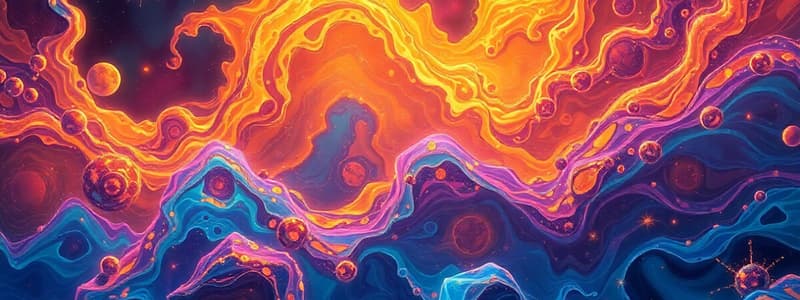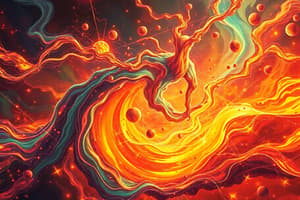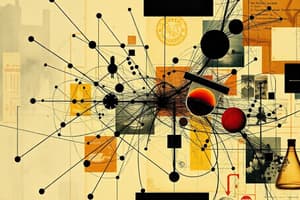Podcast
Questions and Answers
Which reaction shows a decrease in entropy?
Which reaction shows a decrease in entropy?
- 2KCIO3(s) → 2KCI(s) + 302(g)
- CO₂(s) → CO2(g)
- NaCl(s) → Na+(aq) + Cl-(aq)
- H2O(l) → H₂O(s) (correct)
In which reaction does the entropy increase significantly?
In which reaction does the entropy increase significantly?
- Ag+(aq) + Cl-(aq) → AgCl(s)
- H+(aq) + C₂H₃O₂(aq) → HC₂H₂O₃(1)
- CO₂(s) → CO2(g) (correct)
- N₂(g) + 3H2(g) → 2NH3(g)
Which of the following reactions does not result in an increase in entropy?
Which of the following reactions does not result in an increase in entropy?
- 2NO(g) → N₂(g) + O2(g)
- H2(g) + Cl2(g) → 2HCI(g) (correct)
- KCI(s) → KCI(I)
- H+(aq) + OH-(aq) → H₂O(1)
Identify the reaction that results in a decrease in entropy.
Identify the reaction that results in a decrease in entropy.
Which reaction indicates that the system is moving towards higher entropy?
Which reaction indicates that the system is moving towards higher entropy?
Flashcards
Entropy (ΔS)
Entropy (ΔS)
The measure of randomness or disorder in a substance.
Solid Entropy
Solid Entropy
Solids have low entropy because their particles are tightly packed and have little movement.
Gas Entropy
Gas Entropy
Gases have high entropy because their particles are widely separated and move freely.
Entropy Increase in Reactions
Entropy Increase in Reactions
Signup and view all the flashcards
Entropy Decrease in Reactions
Entropy Decrease in Reactions
Signup and view all the flashcards
Study Notes
Entropy and Chemical Reactions
- Entropy is a measure of the randomness or disorder of a system.
- Entropy increases when a system becomes more disordered.
- Entropy decreases when a system becomes more ordered.
Factors Influencing Entropy Changes
- Phase Changes:
- Solid to Liquid: Entropy increases (more disorder)
- Liquid to Gas: Entropy increases (more disorder)
- Gas to Liquid: Entropy decreases (more order)
- Liquid to Solid: Entropy decreases (more order)
- Number of Molecules:
- Reactions that increase the number of molecules: Entropy increases.
- Reactions that decrease the number of molecules: Entropy decreases.
- Complexity of Molecules:
- Reactions forming more complex molecules: Entropy generally decreases.
- Reactions breaking down complex molecules: Entropy generally increases.
Identifying Entropy Changes in Reactions
- To determine if a reaction results in an increase or decrease in entropy, analyze the following:
- Phase changes of reactants and products.
- Number of molecules on each side of the reaction.
- Complexity of molecules on each side of the reaction.
- Reactions with a net increase in the number of molecules generally have a positive entropy change.
- Reactions with a net decrease in the number of molecules generally have a negative entropy change.
- Reactions that form more complex molecules generally have a negative entropy change.
- Reactions that break down more complex molecules generally have a positive entropy change.
Studying That Suits You
Use AI to generate personalized quizzes and flashcards to suit your learning preferences.




